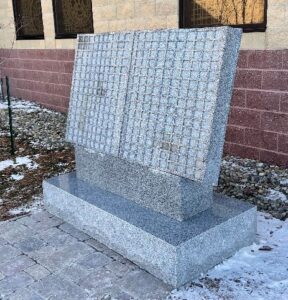
By Pastor Wangelin
The Our Savior Memorial Garden has a number of special features that give evidence to our Christian faith “in the resurrection of the dead, and the life of the world to come” (Apostles Creed). One of the most striking features of the garden is the large granite Book of Life, which is a sculpted monument weighing 5,500 lbs. in the shape of an open book, with 300 squares available to hold brass plaques that will have the name of each person buried in the garden and the years of their birth and their transfer to the Church Triumphant.
The Book of Life is mentioned in the Bible, in both the Old and New Testaments, and conveys the certainty and
assurance that God knows us and that we belong to Him. In this way, it is a fitting way to portray the names of those who have gone to be with the Lord in paradise and have received the crown of life. Their names are recorded on the sculpture just as the Bible says God records our names in His book of life.

In any gathering or community, lists of names are drawn up to keep a record of who was there or who is officially a part of the group. Think of how many lists there are that your name appears on. Most of the time, it is a good thing that entities have our names written down with some information about us, especially our bank, the doctor’s office, service providers, memberships and subscriptions. Our names are written down to “make it official” and ensure that we get the benefits or services they offer. Our names are registered by the state to record our nationality and place of residence so that we get the benefits of being a citizen or resident. The Bible uses this same concept to describe how our names are known to God and that our salvation is secure. It is portrayed as a heavenly registry, listing the names of those made righteous by faith and saved by God.
Our salvation is “official” because our names are written in God’s Book of Life.
The specific phrase “book of life” appears seven times in the Bible (Psalm 69:28, Philippians 4:3, Revelation 3:5, 13:8, 17:8, 20:12, 21:27). Other Biblical references speak of God writing our names “in heaven” or in “His book” and that these books will be read on the Last Day (Exodus 32:31-32, Psalm 139:16, Daniel 7:9-10, 12:1-3, Luke 10:19-20, Hebrews 12:22-23). The following is a brief summary of what these Scripture passages say about the Book of Life.
Moses made the first reference to God’s book in the tragic incident of the golden calf. Moses made a desperate plea for God to forgive the sin of the people, otherwise to have Moses’ name “blotted out” of God’s book that He had written (Exodus 32:32). To be “blotted out” of the book would have meant no longer being listed among the people of God. David in Psalm 69:28 is confident that God’s Book of Life only lists the names of the righteous. Psalm 139:16 either refers to a different book, or indicates that more is written in God’s Book of Life than just our names. “All the days ordained for me were written in your book before one of them came to be.”
In the book of Daniel, the imagery of God’s book is given in connection to the final judgement. In chapter 7:9-10, God as the Ancient of Days sits on His throne to judge, “and the books were opened.” In chapter 12:1-3, it speaks of the Day of Resurrection at the end of the age.
“At that time Michael, the great prince who protects your people, will arise. There will be a time of distress such as has not happened from the beginning of nations until then. But at that time your people—everyone whose name is found written in the book—will be delivered. Multitudes who sleep in the dust of the earth will awake: some to everlasting life, others to shame and everlasting contempt. Those who are wise will shine like the brightness of the heavens, and those who lead many to righteousness, like the stars for ever and ever.”
In the New Testament, Jesus tells His disciples that they should rejoice, because their names are “written in heaven.” The Apostle Paul says that his companions and coworkers have their “names written in the book of life.” Philippians 4:3.
Similar to Jesus’ expression of rejoicing that our names are “written in heaven,” Hebrews 12:22-23 also connects joy with the names of God’s people (in this case the Church) written in His book.
“But you have come to Mount Zion, to the city of the living God, the heavenly Jerusalem. You have come to thousands upon thousands of angels in joyful assembly, to the church of the firstborn, whose names are written in heaven. You have come to God, the Judge of all, to the spirits of the righteous made perfect.
God is the Judge of all, and there will be a day of reckoning when all will be held accountable for their deeds. On the Day of Resurrection, the saints whom God made righteous by faith will be preserved for eternal bliss and enter everlasting life. These are the righteous whose names are written in the Book of Life.
The most references to the Book of Life are found in Revelation. In Revelation 3:8, Jesus makes this promise to those who are victorious and persevere in their faith, “I will never blot out the name of that person from the book of life, but will acknowledge that name before my Father and his angels.” This is an assurance from Jesus that our names will stand in God’s book and memory. Jesus knows us, we belong to Him, it is “on the books” and official!
Revelation 13:8 points out that those who have their names written in the Book of Life do not worship the beast or renounce their faith, especially during times of tribulation. It is the unbelievers, whose names are not written in the Book of Life, who are led astray by the evil in the last days. They are called “inhabitants of the earth” in Revelation 17:18, whose “names are not written in the Book of Life from before the creation of the world.” Here we see that the names in the Book of Life have been there since before we were born, even before the creation of the world, as a part of God’s eternal election and divine foreknowledge.
In the final judgement and new heavens and new earth of Revelation 20 and 21, the Book of Life plays a role where it says,
“And I saw the dead, great and small, standing before the throne, and books were opened. Another book was opened, which is the book of life. The dead were judged according to what they had done as recorded in the books.”
While the deeds in the books would condemn everyone, since “all have sinned and fall short of the glory of God,” (Romans 3:23) if someone’s name was written in the book of life, their deeds were not held against them and they are ushered into eternal life. “Anyone whose name was not found written in the book of life was thrown into the lake of fire” (Revelation 20:15). When the righteous enter the new heavens and the new earth – the heavenly Jerusalem – they are admitted because they are “those whose names are written in the Lamb’s book of life” (Revelation 21:27). Here the book of life is described as belonging to the Lamb, Jesus, since He was the one who died for them and purchased them with His blood. They live because Jesus lives.
I’d like to share two concluding thoughts on this topic of the Book of Life and the scriptures we have surveyed. The first one is how the Book of Life doesn’t play a huge role in the Bible, and yet it shows up in every section – from Moses in Exodus, to the Psalms and Prophets, once by Jesus, once by Paul, once in Hebrews, and a handful of times in Revelation. It is a truly biblical concept and not just found in one section or another. This makes the Book of Life a constant thread for God’s message that reflects its significance. God’s book of life was “written from before the creation of the world” (Revelation 17:8). This is a wonderful assurance that God knows us and knew of us even before creation. This fits with what Paul writes in Ephesians 1:4,
“For [God] chose us in [Christ] before the creation of the world to be holy and blameless in his sight. In love He predestined us to be adopted as His sons through Jesus Christ, in accordance with His pleasure and will.”
This is a powerful statement of God’s grace, and how God chose to save us even before the creation of the world. Pastor Sam Storms points out, “You don’t believe in Jesus in order to have your name written, but because your name has been written.” This supports our Lutheran understanding of predestination, in that God foresaw and chose to save us by grace through Jesus’ death and resurrection. Nevertheless, we are encouraged to remain steadfast in faith so that we do not fall away from grace and have our names “blotted out.” That our names are written in the Book of Life is a comfort and assurance for the believer in Christ, and gives glory to God alone for our salvation.
Secondly, Jesus says that we should “rejoice that your names are written in heaven” (Luke 10:19). That our names are written in the Book of Life is a source of joy for believers. We can constantly rejoice that our future is secure with Christ because our names are written in the book. 1 Peter 1:3-4 says,
“In his great mercy he has given us new birth into a living hope through the resurrection of Jesus Christ from the dead, and into an inheritance that can never perish, spoil or fade – kept in heaven for you.”
Then he says, “In this, you greatly rejoice!” (1 Peter 1:6). Because our names are written in the Book of Life, we have a sure and certain hope that the best is yet to come! In Luke 10, when the seventy-two disciples returned to Jesus who had sent them out, they were ecstatic. They had driven out demons in Jesus’ name! That was a good day. And Jesus tempers their joy only by saying that compared to that, an even greater thing is to “rejoice that your names are written in heaven.” The disciples would have other good days, but it would not always be like that. Indeed, many of them would even be led to their deaths for professing Jesus as Lord. We may have great days and wonderful moments while following Jesus, but there is a constant joy for the believer that is never shaken – even on the bad days. The joy that we have in knowing our names are written in the Book of Life can never be taken away. It is steady and constant through the ups and downs of life. We have a lot of things that may bring us joy, but they are so often temporary and fleeting. When we rejoice in the Lord always, we have a source of lasting, constant joy. I’ll say it again, Rejoice!